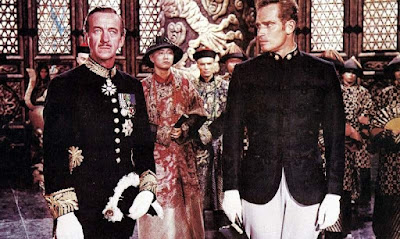Several decades ago now, I was teaching a five-night-a-week English as a Second Language class in Monterey Park. Most of the students were recent immigrants from China and Taiwan and other Asian countries although someone from Saudi Arabia or Mexico would occasionally sign up. On Friday nights, we were given permission to watch American movies and practice conversational skills in English with the students. One Friday, I showed 55 Days at Peking, a film set against the backdrop of the Boxer Rebellion of 1900, to the class and they became so angry with me. They were adamant that the movie was completely inaccurate in its portrayal of what truly happened. Well, of course, it isn’t accurate. It’s a Hollywood movie that depicts an episode of Chinese history from the perspective of those who were trying to exert influence in China: England, the United States, France, Germany, Russia, Japan, etc. – in other words, the very people that the Boxers were rebelling against. The central character, of course, is an American, Marine Maj. Matt Lewis, played by Charlton Heston with his usual woodenness. He did always think he was more charming than he actually was, didn’t he? Sometimes I think the only reason to watch a Heston movie is for the inevitable shirtless scene. Ava Gardner plays a Russian baroness, a beautiful woman with a past, which means that all of the other women hate her because their husbands can’t help but admire the Baroness Natalie Ivanoff’s beauty. Well, who could resist Gardner? She was always a good actress, but she isn’t given much to do here except try to escape from China, fail, and then tend to a wounded soldier. Oh, she and Heston do get to share a hotel room because there’s no other place for him to stay, but sadly, not enough is made of that tantalizing possibility. David Niven plays the leader of the British contingent in China, Sir Arthur Robinson, which means he’s also the de facto leader of the foreign legation. He and his wife question why Great Britain (and everyone else) is in China, and there’s lot of talk of leaving, but do colonial powers ever truly leave an area? The most embarrassing bit of casting is having British actors in yellowface. Dame Flora Robson plays the Dowager Empress, who mostly just sits around and speaks in odd metaphors. She has two advisors, the prince (who openly supports the Boxers trying to rid China of Western influence) and a general. The prince is played by another British actor, Sir Robert Helpmann, and Leo Genn, yet another Brit, plays the general. Yes, such casting was common at the time, but it’s still grating to see it on the screen. The film features outstanding production design, marvelous costumes, lovely cinematography – all depicted on a rather grand scale. At the level of an epic, it works well enough, I suppose, but the film is a bit soulless since it’s clearly taken what might charitably be characterized as the wrong side of the battle to support. The battle sequences themselves are well staged, but your natural sympathies might be on the side of those who are being occupied. The film has to have Robinson’s son get shot in order to get some emotion going. By the time Heston’s Lewis has to tell an Asian girl that his American father has been killed, you start to wonder if the only way to make the viewer care for the Western side of the story is to harm a child. When Lewis has the brilliant idea to use the sewer system to get in and out of the palace grounds to destroy some ammunition – something none of the Chinese had apparently ever considered? – you have to acknowledge that maybe my students all those years ago were right to be angry with me. Come to 55 Days at Peking for the spectacle but avoid trying to learn any accurate historical information. Consider yourself warned.
Oscar Nominations: Best Original Song (“So Little Time”) and Best Substantially Original Score

No comments:
Post a Comment